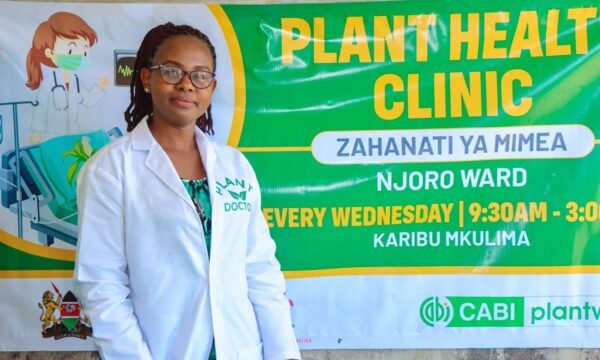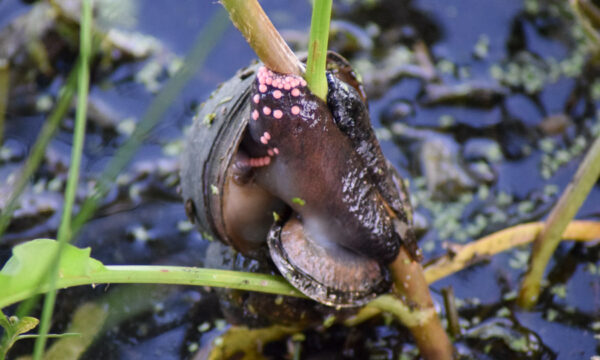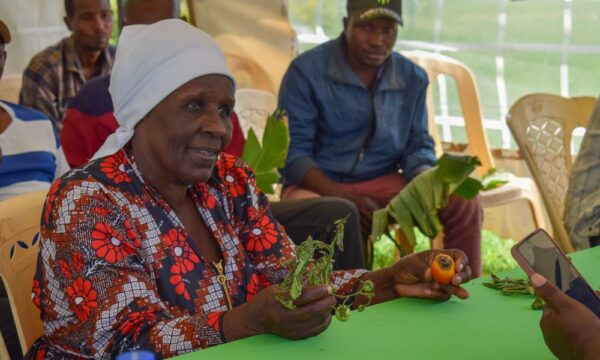
A fish farmer in Nigeria using a mobile phone to communicate to buyers in the capital © Reboot via Flickr (CC-BY-NC 2.0)
Farmers and vets across Africa are increasingly using mobile phones to issue alerts about potential pest and disease outbreaks. The recent introduction of mobile phones that use the open source Android operating system or the iPhone iOS operating system and include GPS and Google Maps have provided new opportunities for developing mobile phone applications, allowing communication between field workers and their project databases. ‘Smartphones’ offer computer like functionality and internet connectivity with built in Global Positioning System (GPS) receivers that give a detailed location reference.
Mobile phone applications can be installed on the phone to issue early warnings of pest and disease outbreaks. In Kenya, where three out of four people are reported to have a mobile phone, the Food and Agriculture Organisation (FAO) has partnered with the Royal Veterinary College and local NGO VetAid to support pilot testing of a mobile phone application called EpiCollect, developed by a research team led by David Aanensen at Imperial College London. EpiCollect is a generic software developed for Android and iPhone which allows multiple data records to be entered and stored on a mobile phone and linked to a central web application that allows mapping, visualisation and analysis of data from a central database. The latitude, longitude and altitude of the current position of the user is returned from the GPS unit of the phone.
The application and storage space are provided for free on the EpiCollect website, which assigns a unique location for each project, meaning that only users connected with the project can access the data. Instead of vets having to travel to remote locations, record data, and then travel back to district offices to record paperwork the information can now be entered directly into a mobile device in the field and synchronised to a project database while the exact location is recorded using GPS.
At present, EpiCollect is only being used by field veterinarians with phones provided by Google Kenya for the testing phase. Eventually it is hoped that tools could be made available to well established networks of community animal health workers. Although only a third of Kenyans have access to internet at present, 99% of those internet subscriptions are for access from a mobile phone.In addition, FAO’s Regional Emergency Office for East and Central Africa, partnered with Oxfam, are using Nokia Data Gathering (NDG) to monitor water points in pastoralist areas as an early warning indicator for drought in Kenya and Ethiopia. The FAO is also assessing how mobile technologies can be used to gather and disseminate information about markets and traders.
There is also potential for this kind of technology to be used in arable farming- for example a user at a plant clinic could use the mobile device to enter data on the symptoms, diagnoses and management recommendations of an insect pest on a crop, and take a photo of the pest and then save the record, which can later be synchronised with a central database.
To read more about Plantwise plans to carry out mobile data collection in Kenya this year, read this blog by Claire Curry.
References:
‘Cell phones revolutionizing Kenya’s livestock sector’, FAO, March 2013
‘Mobile app sees science go global’, BBC News, Sepetember 2009
Aanensen, D., Huntley, D., Feil, E., al-Own, F., & Spratt, B. (2009). EpiCollect: Linking Smartphones to Web Applications for Epidemiology, Ecology and Community Data Collection PLoS ONE, 4 (9) DOI: 10.1371/journal.pone.0006968
5 Comments
Leave a Reply
Related News & Blogs
Biocontrol that goes the distance: Acerophagus papayae in Kenya
Acerophagus papayae can slow the spread of the invasive papaya mealybug and benefit the wider community. Recent monitoring efforts have shown that the natural enemy is reaching long distances away from the original release sites. Papaya mealybug attack…
20 May 2025





Reblogged this on Science on the Land and commented:
argylesock says… See also what Plantwise says about using mobile technology to share information about crops.
Wow. It is nice to read a factual post in the positive influence technology can have if we use it the right way!
It’s nice to read such news, especially from Kenya Region. When you use specialised applications on a smartphone, I believe there are endless possibilities Good luck 🙂
It is nice to know that Kenya is now involved with mobile technology. Mobile phone technologies are presenting Africa’s smallholder farmers with an unprecedented opportunity to run their operations more productively and to grow their own income levels.xperience shows that as farmers learn to trust insurance, they expand their coverage and are comfortable investing more in their farm, raising their productivity and increasing their food security.”
The number of pastoralists in Kenya is huge. Hope it will make a huge difference to the farmers.